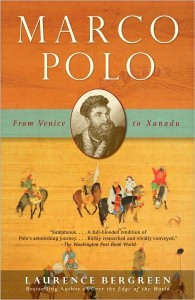Happy Intercession Dearest Readers!
Phew! We’re all sure glad that the semester’s over, and we’re sure that you are too! It’s been a long Spring Semester, and now we have Summer to look forward to! But that doesn’t mean that we shouldn’t keep our brains sharp and ready for our next set of classes!
So, with that in mind, we bring to you another Faculty Pick! Our very own Dr. William Carter from the STC History Department has read and reviewed the following book, which is fresh to our shelves, and we think you should Check It Out!

Bergreen, Laurence. Marco Polo: From Venice to Xanadu. New York: Vintage Books, 2007.
In Marco Polo, From Venice to Xanadu (2007), Laurence Bergreen presents a modern retelling of the Venetian’s momentous and epic journey spanning 24 years and vast expanses of Asia during the late 13th century. Bergreen claims that, cultural biases and several exaggerations aside, overwhelming evidence supports Marco Polo’s own accounts of his experiences among different peoples and places across central Asia before becoming an honored guest, public servant, confidant and captive of the most powerful man on earth at the time, Kublai Khan. Polo described in journalistic detail the cultures he encountered, their diversity, and their extent in the Mongolian empire. His excitement becomes infectious when describing the huge, interconnected and well-planned Chinese urban centers (Hangzhou being the largest of all, and in the world, with 1.5 million people), and their remarkable cultural achievements in art, architecture, engineering, printing presses publishing a profusion of books, paper money, gun powder, and an immense amount of commercial activity that dwarfed anything in Europe. The Polos never ceased to marvel at the Asian fortunes made off the incredible variety of products–foods, spices, jewelry, silk, carpets, games, gambling, knowledge, and art. All of it seemed so wonderful, and futuristic, to the Polos. Bergreen rounds out these stories with infusions of our current thinking on the geography, flora, fauna, and cultures that Marco Polo encountered, and his seminal influence on the imaginations of subsequent explorers, merchants, and intellectuals who brought the modern world into being.
Our reading group found several aspects of Marco Polo’s journey worth discussing at length—including his coming of age and transformation into an increasingly open-minded, cosmopolitan, and empirically bent thinker over the years; his encounters with a diversity of cultures and diverse cultural norms and values; and his discovery of and participation in the court of Kublai Khan and, even more impressive, Chinese civilization millennia in the making. Much food for thought here.
Contributed by: Dr. William Carter, Professor of History
Has this peaked your interest? It’s peaked ours! Don’t forget, you can read this book for yourself by checking it out from our Library! (click here for availability)